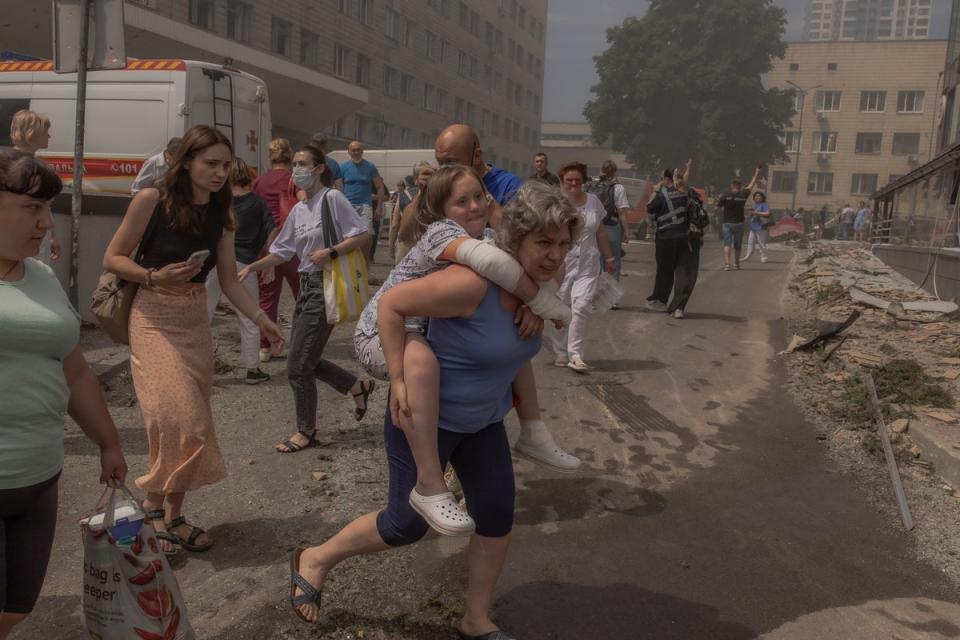Voices: Why does it take Russia bombing a children’s hospital to make us care about Ukraine?
“Putin Bombs Cancer Kids”. The headline in the Daily Mirror is as powerful as it is succinct, and shows how, even in a vicious conflict such as Ukraine, where the rules of war are routinely ignored, some actions can still “cut through”.
Usually, Putin’s crimes against humanity, at least after the initial shock of the invasion, became mere background noise to those in the West.
The targeting of the largest paediatric unit in the country was indeed a heinous act, and a cynical one that was ordered by Vladimir Putin, the latest in his pitiless war of aggression in Ukraine. Sometimes you wonder whether the Kremlin is playing some dark satirical game when it tries to pass off a children’s hospital in Kyiv as a Ukrainian air base.
Altogether 41 people died in the series of bombings across the country, including one doctor in the hospital where some of the terrified, traumatised children were injured. It was an act of audacious cruelty that has brought the war in Ukraine back to the attention of the world.
It is knowingly, obviously, sadistically, aimed at the most defenceless people of all. This was, in a sense, Putin’s aim. He wanted to demoralise the Ukrainian people, but he also wanted to show the Western leaders making their way to the Nato summit in Washington just how determined – and ruthless – he still is.
He always seems particularly incensed when Volodymyr Zelensky, the Ukraine president, turns up at these gatherings. The Russian president wants to show his displeasure and, being a bully, he picks on the most vulnerable. He conflates and confuses power with barbarity.

In terms of media coverage, something of the same may be true of specific incidents in the war in Gaza. The atrocities perpetrated by Hamas on 7 October – the murder, rape and kidnapping of civilians at a music festival – also grabbed the attention of the world, as well as the ire of Israel. It attracted huge public sympathy for the Israeli people in a way that a missile attack on an army base, say, would certainly not have done.
As with the war in Ukraine, the Israeli invasion and its aftermath after a time stopped making the headlines every day; but some incidents did press on the world’s conscience. When seven international aid workers from the World Central Kitchen were killed when the Israeli military attacked their convoy in April, the death toll was not particularly large by comparison with what had been going on around it, actions that collectively led to accusations of genocide being levelled at the International Court of Justice. There was a global outcry and President Biden declared himself “outraged and heartbroken", which he did not make public every time there was loss of life.
The uncomfortable fact is that because the dead included three Britons, a Pole, an Australian and one dual US-Canadian citizen, the story suddenly seized the world’s imagination, standing out from the rubble and the starvation. The assaults by the Israeli Defence Forces on hospitals and schools in Gaza have also tended to attract more attention, but they have to be more demonstrably callous every time to make the Western public take notice.
The lesson seems to be that no matter how fatigued Western governments and their respective publics grow at these intractable conflicts, there will always be some atrocity that can jolt our consciences back to life. Long conflicts always have moments when governments are forced to take action. Even in the successive destructions of Afghanistan, Syria and Iraq there would be massacres or the demolition of ancient cultural monuments that would prompt fresh questions.
The same was the case in America’s decade-long conflict in Vietnam, and the 30 years of the Troubles in Northern Ireland. We still recall the incidents – in Vietnam, My Lai and the famous image of the “napalm girl”; in Ireland, Bloody Sunday and the Omagh bombing.
No wars are really “forgotten”, and all have the potential to cause death, destruction and misery that makes people far away call on their governments to act. Every so often they pay a call on us and impinge on our consciences.
In the case of the sick children in Kyiv, the bombing should make Nato leaders send the weapons and ammunition Ukraine needs to defend itself; and make European governments find the money to re-arm and to expand Nato in order to deter Russia and prevent the war in Ukraine from spreading.
It is why Keir Starmer is right to want to put Ukraine on an “irreversible” path to Nato membership, and why Nigel Farage is wrong to say this war was provoked by the West. The plain fact is that if Ukraine had been a full member of Nato then Putin would never have invaded and those kids in Kyiv wouldn’t have been bombed. Every atrocity carries a lesson.


